How Many Watts Can 12 Gauge Speaker Wire Handle?
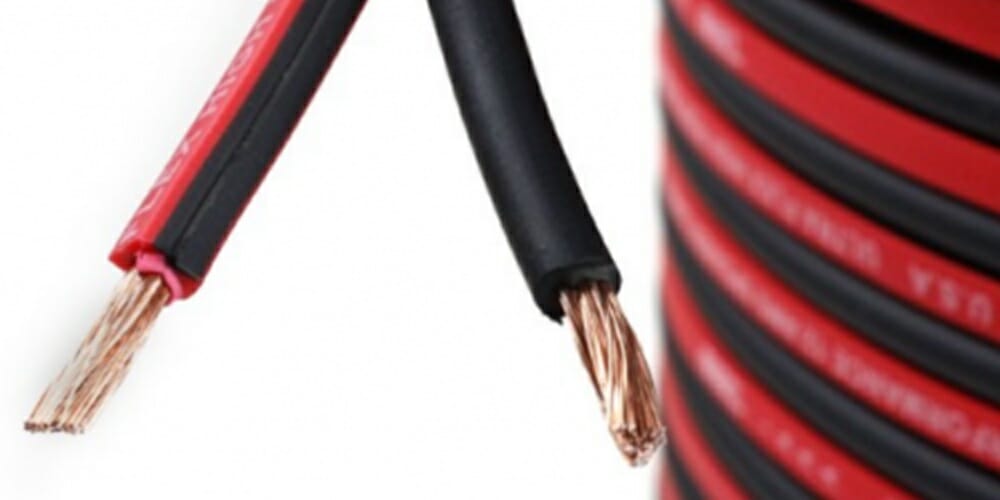
12 Gauge speaker wire is known for being too thin to handle a full-range speaker.
Should you go with a 12 Gauge speaker wire? How many watts can such a wire handle? In this post, we take a look at how many watts can 12 gauge speaker wire handle and how much you should use. Let’s get started.
A 12-gauge speaker wire can handle up to 2400 Watt. However, there is more to gauge speaker wires than the capacity of watts they can handle. Other things you have to consider before installation include:
- The power output of your stereo or amplifier
- The Impedance (ohms) rating of your speaker.
- The length of cable required for your speaker system
What Size of Speaker Wire Do I Need: General Tips
Let’s establish a fact.
Most speakers do not come with speaker wire.
That means you are left with the responsibility of choosing the right wire and gauge for your system. So, how do you know the wire gauge you need? The thickness of wires is identified by the AWG (American Wire Gauge) number.
Usually, wires with lower gauge numbers are the thicker wires. That means 12 AWG wire is thicker than 14-gauge wire and the 18-gauge is the thinnest. Thicker wires have minimal resistance to current flow.
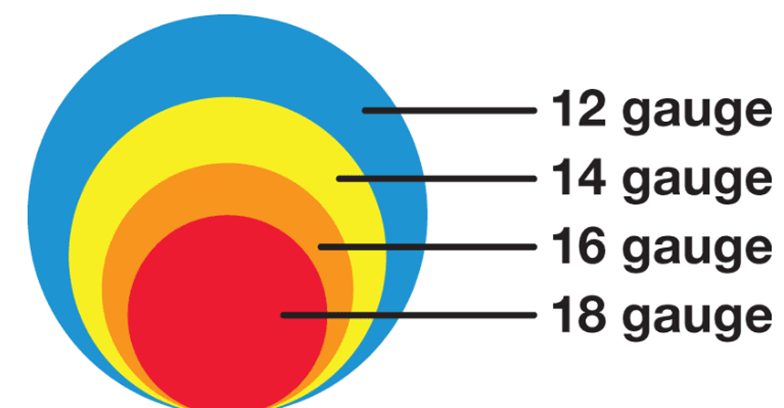
Therefore:
- Use a thick wire of 12 or 14-gauge for low-impedance speakers with 4 or 6 ohms, high-power applications, and long-wire runs.
- Use 16-gauge wire for relatively short runs of less than 50 feet to 8 ohms speakers. It is easier to work with and more cost-effective.
You may also want to ask a professional for a recommendation on the right gauge speaker for your installation.
Basic Everyday Wire Size Table
To achieve a successful electrical installation, it is crucial to have the perfect wire size.
The wire size table shows the “ampacity” of the wires per their diameter. By the way, it is highly impractical to calculate the resistance of a specific wire length for a particular wire diameter and that is where standards come in. The AWG is a standard used for measuring the diameter of any electrical conductor.
See the simple everyday wire size table you can consult when using gauge wire:
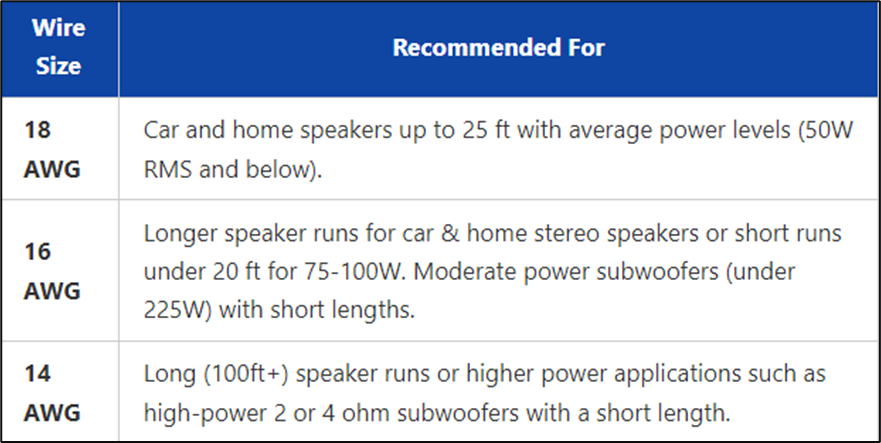
Tips to Find the Right Size Wire for ANY Length of Speaker System
Finding the correct gauge speaker wire can be a bit of a challenge.
However, if you familiarize yourself with the basics of audio wires, it becomes easy to make the right decision. As we mentioned earlier, the gauge of a wire represents its thickness. That means thicker wires have lower gauge numbers and the thinner wires have higher gauge numbers.
The most common speaker wires are 12-gauge, 14-gauge, 16-gauge, and 18-gauge. So, how do you know how to choose the right speaker wire gauge for your speaker?
Three basic things determine the correct gauge speaker wire that you need:
- The power output of your stereo or amplifier
- The Impedance (ohms) rating of your speaker. This is also referred to as the nominal impedance
- The length of cable required for your speaker system
Speaker Wire Gauge Calculator: How to Use It
The three basic things highlighted above are proven factors that determine the correct size wire that you need for your speaker system.
However, you may still have issues understanding how to choose the right wire. That is where the speaker wire gauge calculator comes in. Whether you are installing car audio systems or home speakers, this calculator will work just fine.
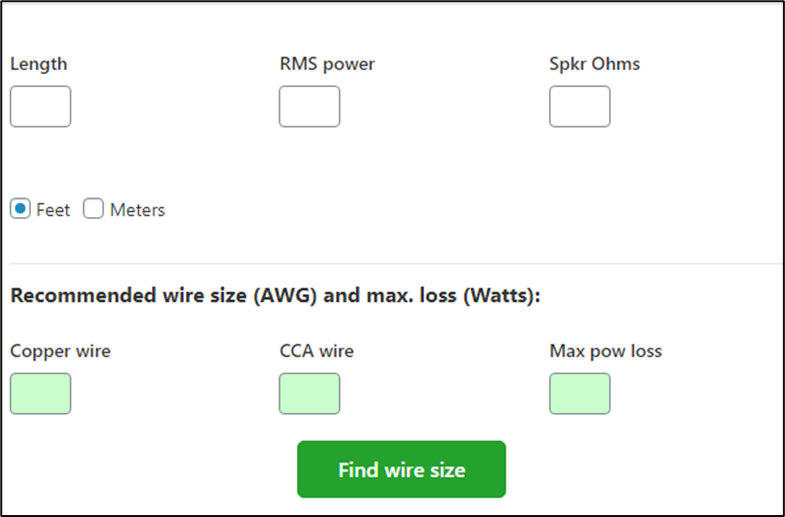
Using the speaker wire gauge calculator helps to recommend the correct wire gauge that is best for your installation based on the speaker ohms, power, and the length you need. To use the gauge speaker wire calculator, follow the steps below:
Step 1
- Enter the length of wire you need, which can be fractions or whole (1)
- Next, input the continuous power/RMS for your stereo or amp
- Next, enter the impedance in ohms for the speaker
Step 2
Click on the button to get accurate results.
Step 3
Check the wire calculator output, which will show as follow:
- The smallest wire size that has 5% or less power loss for copper-clad aluminum and copper wire
- The power loss on the wire at maximum power output in Watts
Understanding the Speaker Wire Gauge Chart
So, let’s try to dive deeper into the speaker wire gauge using the chart below.
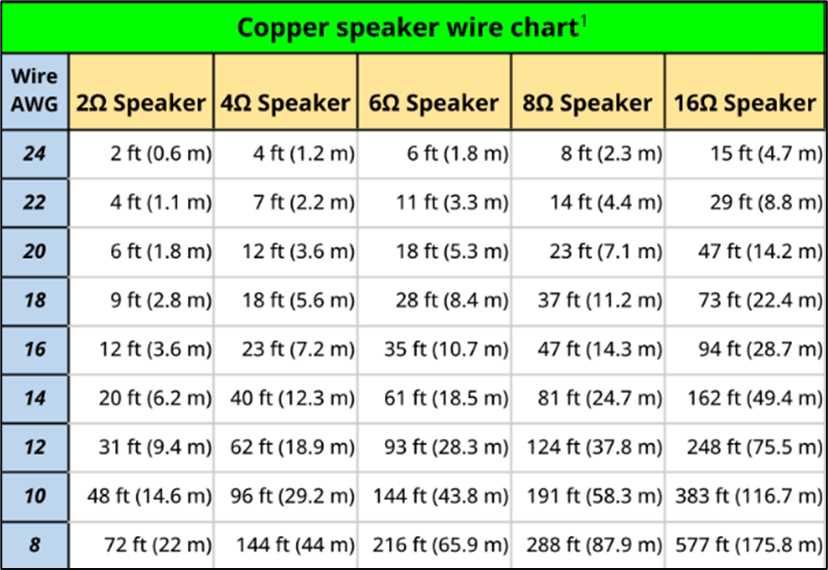
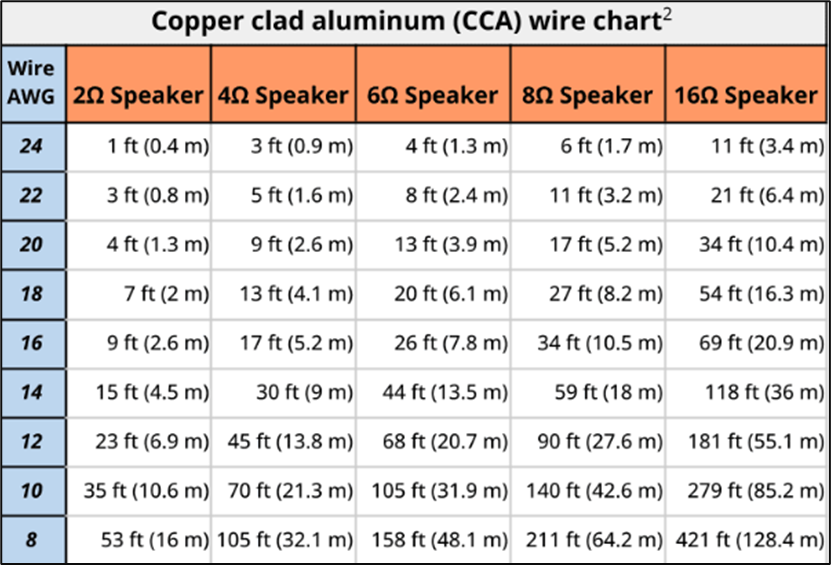
Note that this chart represents the maximum recommended length of wire for each wire gauge based on the ohm load of the speaker. Additionally, the maximum lengths are determined by the wire power loss of 5% or less at the speaker’s maximum power.
If you are unsure of your amplifier or stereo power, the charts above will be a great help. You can easily estimate the wire length to use without losing much power since you know the ohm rating of the speaker.
We have included both the copper-clad aluminum wire and copper wire charts, so you can use either of them based on the wire you have. You should note that the length of aluminum will be shorter than that of real copper because it has a lower conductivity when compared to copper. (2)
How to Choose a Speaker Wire Gauge for Long Distances
So, what if your installation is beyond factory car audio systems speaker wires? What if you are planning to install a wire length of about 50ft?
The general rule here is to double the size. How do you do this? Select a wire thickness that is two sizes up from the actual size that you would use if you are working with a short distance.
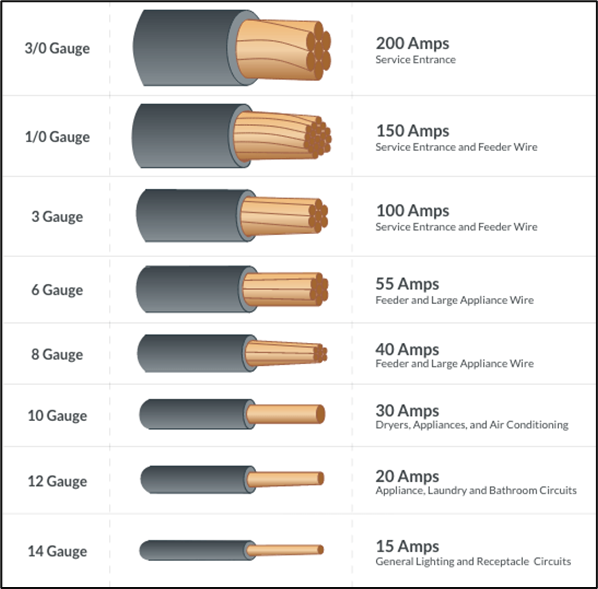
That is because the electrical conductor size (the gauge number) as per wire standards decreases or increases by an even number when you subtract or add 2. Odd numbers are not popularly used in the calculation.
For example, an 18-gauge wire will lose roughly 4 Watts at peak power if it is 50 feet long. Therefore, you need to use a speaker cable that is 2 sizes up to avoid the loss. That means you would choose 14 AWG wire.
Take a look at some of our related articles below.
- How to wire speakers with 4 terminals
- What gauge wire from battery to starter
- How many watts can 16 gauge speaker wire handle
References
(1) fractions – https://www.wikihow.com/Multiply-Fractions-With-Whole-Numbers
(2) copper-clad aluminum – https://patents.google.com/patent/US3854193A/en
